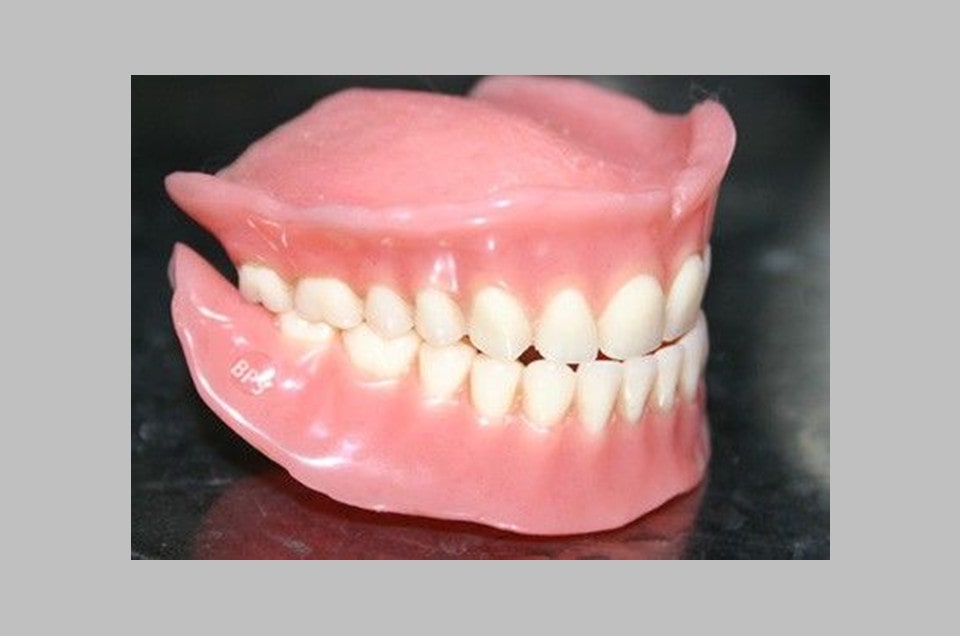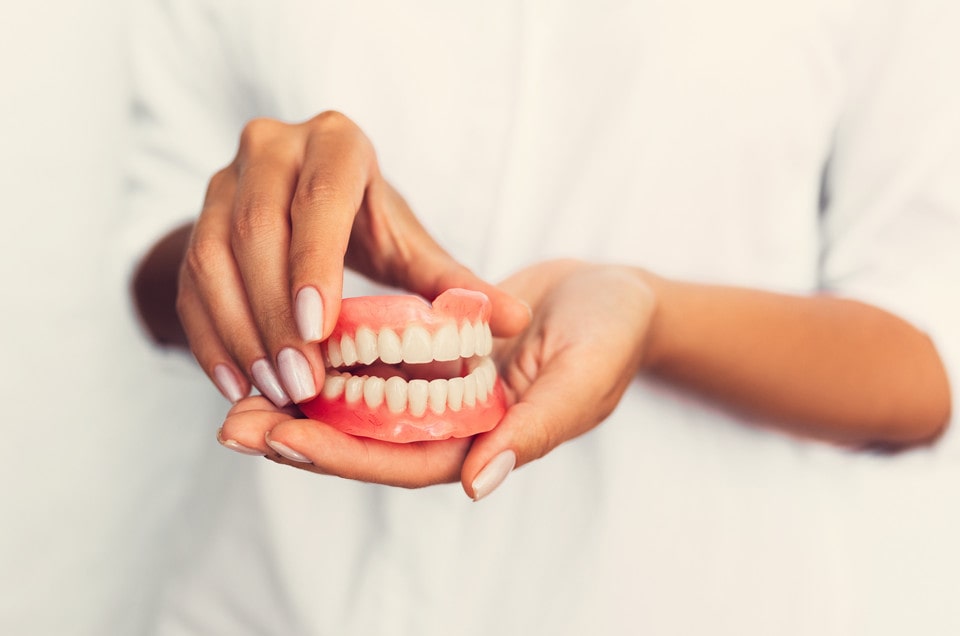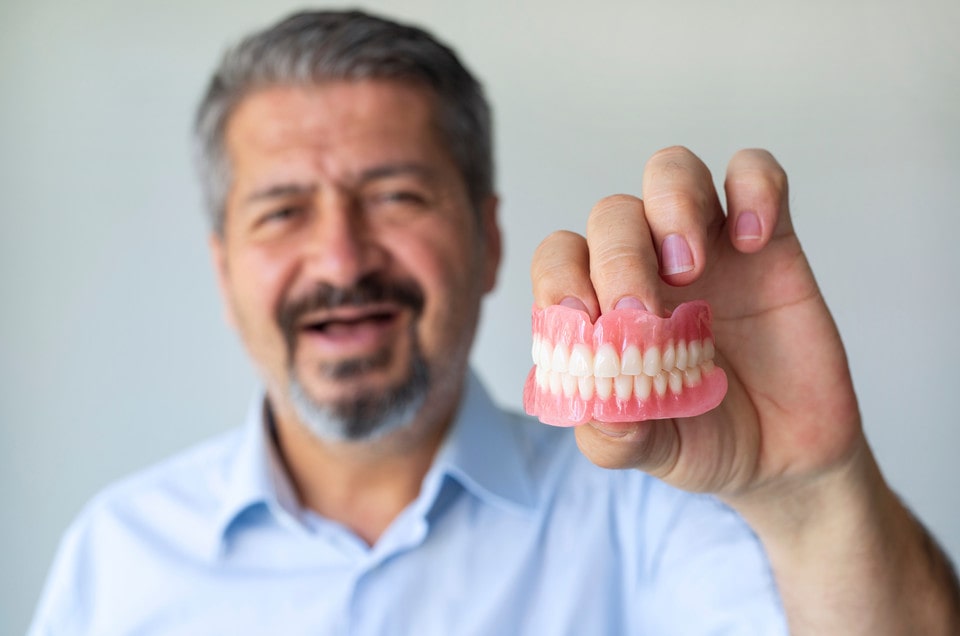There are many home remedies online on how to whiten dentures. While some of these are good methods that are cheap and don’t involve going to a dentist, others are dangerous and can lead to damaged dentures.
Some may even make the situation worse. That’s why this article is here to help you out. It covers the 10 safest ways to clean your dentures, as well as what to avoid and healthy denture cleaning practices.
Can You Whiten All Dentures?

Image source: Pinterest
It is possible to whiten all dentures. However, it is important to note that you can only whiten dentures to their original color. If you want a lighter color for your dentures than the one they had when originally made, the only option is to find a different material to make your dentures out of and get a new set.
Whitening of dentures only allows you to remove stains that have formed over time due to use. It is a good idea to whiten your dentures regularly, because the longer you let the stains stay on the teeth, the harder they are to remove.
Most of the time, dentures are made from acrylic, and can easily be stained when not cleaned properly, by poor hygiene, or by products that are known to stain teeth.
10 Ways to Whiten Your Dentures Safely at Home

1. Hydrogen Peroxide
Hydrogen peroxide is good for whitening. You can use any hydrogen peroxide that you would find in a store, so you don’t have to look for any special types.
Whitening your dentures with hydrogen peroxide is also rather easy. All you have to do is coat your dentures with the peroxide and gently brush the dentures with something like a denture cleaning brush or a toothbrush.
You can continue adding peroxide and brushing until the stains are gone or until you are happy with it. Some studies say that hydrogen peroxide may even have antimicrobial benefits for your dentures as well.
2. Baking Soda
Baking soda works for both natural teeth and dentures. This can be any baking soda so you can use the same product you would use to clean your home or in your baking. Baking soda works to remove stains and eliminate any smells that are occurring on your dentures.
You often mix an equal amount of baking soda and water and use that liquid with a toothbrush to clean your dentures, scrubbing gently until the stains are gone.
3. Denture Cleanser
Denture cleansers are found in almost any area that sells products for your teeth. Your dentist should be able to walk you through the best brands to buy for your specific dentures. Although acrylic is the most common denture material, there are other versions out there, so make sure you know what you are buying.
All of the denture cleaners work a little differently, but they usually involve soaking your dentures for a while. Overnight is the most common, and a lot of people use these to keep their dentures clean while they are sleeping. Using them regularly helps to remove any bacteria or pathogens on your dentures, and they can also remove stains.
Just make sure you give them a gentle brushing and a soak before you place them back into your mouth.
4. Denture Bleach
Though it has bleach in the name, denture bleach cannot be substituted with household bleach. You must specifically look for bleach made for dentures because it is made from different ingredients.
Most denture bleaches will have instructions on them. However, for the most part, all you have to do is soak your dentures in water mixed with about a teaspoon worth of bleach, and soak them for 15 to 20 minutes.
Once they are done soaking, you can gently scrub them with a toothbrush to try and remove some of the stains.
5. Rinsing
A simple solution is to just rinse your teeth after eating or drinking things that are harsh and staining. Some people choose to take them out when drinking, but you still should rinse them after eating anything harsh.
6. White Vinegar
White vinegar is another common product to use in cooking and cleaning, and that works perfectly for your dentures. White vinegar serves a dual purpose of removing stains and eliminating any bacteria that may be growing.
Since white vinegar isn’t very strong, you can soak your dentures overnight before scrubbing them with a toothbrush.
7. Salt
Salt can be used as a cleaning abrasive or a soaking method. You can soak your dentures overnight in salt water. You can also take a wet toothbrush and press it into salt. Using the salt and toothbrush you can very gently scrub your dentures.
8. Lemon
Lemon, like vinegar, is naturally acidic, containing something known as citric acid. While acid can wear down natural teeth, using a mixture of a little lemon juice with water for about 30 minutes can be beneficial for dentures.
When they are done soaking, give a gentle scrub at the end and rinse off with cool water.
9. Floss
Like with natural teeth, floss helps to remove stains and clean out the spaces between the artificial teeth. They can be cleaned in the same way as natural teeth, and done with the same frequency of once a day.
10. Mouthwash
Mouthwash is a method to clean your dentures as well. It isn’t quite as effective as the other methods, but it is still a great option. You just create a mixture made of equal amounts of water and mouthwash and soak your dentures for about half an hour.
When it comes out of the mixture, just give it a gentle scrubbing and you are good to go.
What to Avoid When Whitening Dentures

While there are some things you can do at home to whiten your dentures, it is important to make sure you are following specific practices. Using the wrong materials or following home remedies that aren’t recommended by dentists can keep your teeth stained and damage your dentures.
1. Bleach
One of the most common problems is bleach. You may have noticed that you can use bleach to whiten your dentures at home. However, there is a specific type of denture bleach that is used. Using household bleach like you would use to clean or whiten your clothes will severely damage your dentures.
The teeth and the gums can both breathe down, turning the pink acrylic white and flaky. The teeth can be worn out as well, making the teeth thinner, textured, and feeling wrong in general. This will make your dentures look worse and will require them to be replaced sooner.
2. Using Products That Are Not Made for Dentures
Additionally, toothpaste and bleaching products made for natural teeth cannot be used on dentures. They are meant to work with the natural enamel and material of teeth and will be far too abrasive for dentures.
If used often enough, the teeth of your dentures can become scratched, which makes them more susceptible to staining.
3. Hot Water
Another home remedy that might seem to make sense, but is harmful to your teeth is hot water. While you want to use hot water to clean and sanitize many things, dentures are not one of them.
If the water is too hot, you risk warping the shape of your dentures. If this happens, then your dentures will fit poorly, or not at all.
Healthy Practices to Keep Your Dentures White Longer

Like with regular teeth, some foods, drinks, and habits stain dentures more than others.
Some common things to avoid to keep your dentures white longer include:
• Coffee
• Tea
• Blueberries
• Dark sodas
• Red wine
• Natural or synthetic dyes
• Tobacco products
Additionally, keeping a habit helps a lot. You should be using denture brushes, soap, and denture paste daily to remove any plaque and stains that have formed throughout the day. By taking time to do this, you not only reduce the chances of catching diseases or infections from the dentures, but you make it harder for stains to build up.
Cleaning daily also allows for quicker cleaning. Once you get stains that sit there for a long time, you will need much more time to get the stains out. Cleaning regularly makes getting rid of tough stains a little easier and faster.
It can be tiring to clean your dentures daily, but it is an important practice that you shouldn’t skip. By skipping you not only promote stains, but you risk infections and diseases.
Over time, even with the best care, dentures will lose their shine and develop scratches and stains. When that occurs, you will need to see a professional. They can remove stains, and fix any teeth that need care.
At some point, you will need new dentures as well. So it is best to visit your dentist regularly to keep in touch about the health of your dentures and make sure you are taking care of them properly.










